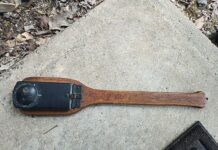Sorry guys and gals, but we are just hours away from the kind of cold weather that can damage outboard and I/O power boats. Act soon or face the consequences next spring.
“Water freezes at 32 degrees and the damages to motors and outdrives can be not only devastating but very costly” ‘ said Ravenna Marine owner Gary Tennefoss, adding that too often, owners feel that storing a boat and motor in an unheated garage can be enough.
Freeze damage
Tennefoss said that he and his technicians see it every spring when freeze damaged motors show up for repair. That’s why Tennefoss describes proper winterization as “everything” in the life of a marine motor, especially if one lives and boats in northeast Ohio where 32 degrees may be just a warm winter day.
Freezing water
Freezing water expands quickly and can completely ruin a motor just as quickly, he said. An I/O outfit can have water in the block, in the power steering cooler, in the manifolds, in the fuel injection cooler and more. It depends on the age of the motor and other factors. New and even recent motors actually have more components that hold water then older models – and more expensive when damaged.
Details
When a detail oriented dealer winterizes an I/O unit, the technicians run the motor up to operating temperature then flush the raw water completely by replacing it with an environmentally safe anti-freeze.
Tennefoss said he also then drains the anti-freeze after it has time to coat and protect all the parts it touches including the lower unit. He said that draining the winter mix is important so that on spring start-up it doesn’t get drained into a lake.
Winter chores
Other important winterization chores are to change oil, replace the water separator fuel filter, stabilize remaining fuel, service the lower unit by removing any fishing line from the prop hub and replacing the oil, and making sure everything such as live wells are completely drained.
We also suggest that owners replace water pump impellers every few years to eliminate any worry about cooling water reaching the motor. That its self is more important than ever, Tennefoss said, explaining that the new I/O’s and four stroke outboards depend on a computer that constantly makes adjustments that affect performance.
Struggling computer
If the motor is not getting the cooling it needs and the motor’s many sensors send troubling messages, the computer has to struggle to win a battle it may not be able to win. Speaking of outboards, the winterization rules for the newer fuel injected models have changed drastically.
Older engines could simply be run dry for winter storage. Then came four stroke carbureted outboards that often came with suggestions to mix a concoction of fogging oil, fuel stabilizer, and other additives then run that in the motor for a few minutes to protect everything.
Fuel injection
Now, fuel injected outboards need some different protection methods, which make them good candidates for dealer winterizations. The new motors, according to Tennefoss, are so technically advanced and expensive, that owners need to very careful to do things correctly.
Ethynol-free gas
Tennefoss suggests that owners need to stick to ethynol-free gas whenever possible or at the very least to use ethynol protection additives to protect motors, gas lines, and anything else it touches and to stabilize any fuel left for storage. He said that older motors are especially vulnerable to ethynol damage.
He also suggests that come spring, boaters do a pre-start at home before heading to the lake. Recently manufactured fuel lines are made to resist the effects of ethynol.












